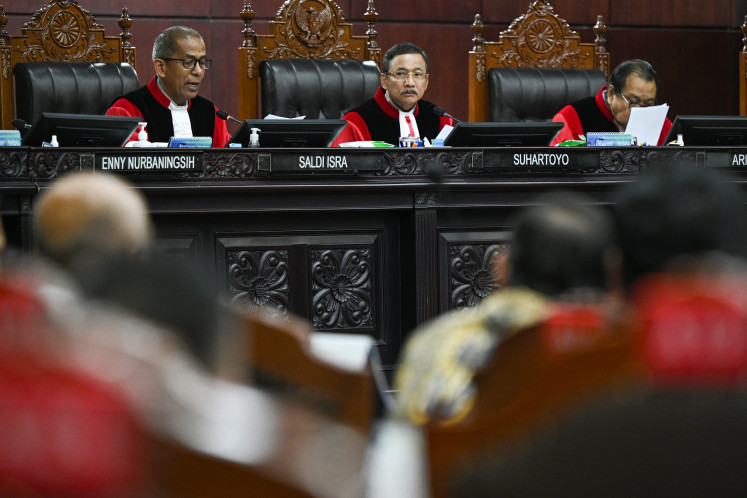Popular Reads
Top Results
Can't find what you're looking for?
View all search resultsPopular Reads
Top Results
Can't find what you're looking for?
View all search resultsEditorial : Increasing the value added
The government regulation that prohibits mining companies from exporting metal ore, starting in 2014, should be welcomed as a well-designed policy that moves mineral commodities higher up the value chain, generating more jobs and boosting our take of profits from the mining sector
Change text size
Gift Premium Articles
to Anyone
T
he government regulation that prohibits mining companies from exporting metal ore, starting in 2014, should be welcomed as a well-designed policy that moves mineral commodities higher up the value chain, generating more jobs and boosting our take of profits from the mining sector.
The requirement to process minerals for export, like the obligation for foreign investors to gradually divest their majority equity holdings in mining concessions after five years of commercial production, has been stipulated in the 2009 Law on Mining
But the timing and manner in which the government has been trying to introduce the policies to investors has caused confusion and uncertainty.
The mining law was virtually kept on the shelf for two years after its enactment in 2009, as the ministries related to mining operations tried haphazardly to improve the coordination of drafting regulations on technical directives for the enforcement of the law.
This time lag unintentionally caused the misperception among investors that the government was not steadfastly serious about enforcing the law, especially the provisions relating to the ban on the exportation of unprocessed metals.
Then last year, the government issued a series of regulations and ministerial decrees providing technical details on the enforcement of the policies.
This is certainly the worst way of ushering in policies to mining ventures that are highly risky, capital and technology intensive and have a long payback period, thereby requiring clear-cut rules and long-term policy direction.
Big risks are already inherent within the mining sector without legal uncertainty and policy inconsistency.
The government should be fully aware that building a smelter, which requires a huge amount of investment, electricity and infrastructure support, is not work that can be completed within only two to three years.
Now, the government seems to have realized that pushing ahead with a complete ban on the export of metal ores in 2014, as scheduled, may technically and commercially be unfeasible.
The government is considering an alternative, transitional policy by allowing mining firms to continue exporting metal ores on the condition that they must submit concrete investment business plans on the development of smelters by themselves or in consortiums with other investors.
The government is also considering slapping an export tax on metal ores during the transition period to provide a clearer policy signal that the government is serious about enforcing the regulation on the compulsory processing of metal ores for mining companies licensed after 2009.
Such a policy is not completely new. Such a measure, for example, has been imposed through a progressive export tax on crude palm oil (CPO) that is tied to international prices of that commodity. The higher the price, the higher the export tax rate. But the main objective is more to encourage the development of downstream industries, rather than increasing revenues.
Abruptly stopping exports in metal ores as nickel, bauxite, manganese, silver and copper could shock mining firms, damage Indonesia’s credibility as the supplier of a wide variety of minerals to the world market and significantly cut into government revenues.
The regulation on metal-ore exports, which is scheduled to be issued early in May, should be clear-cut. But its enforcement should be designed in such a way that it does not cause severe disruption of supplies to overseas buyers, yet is still forceful enough to make mining firms fully committed to developing metal ore processing industries in the country.










